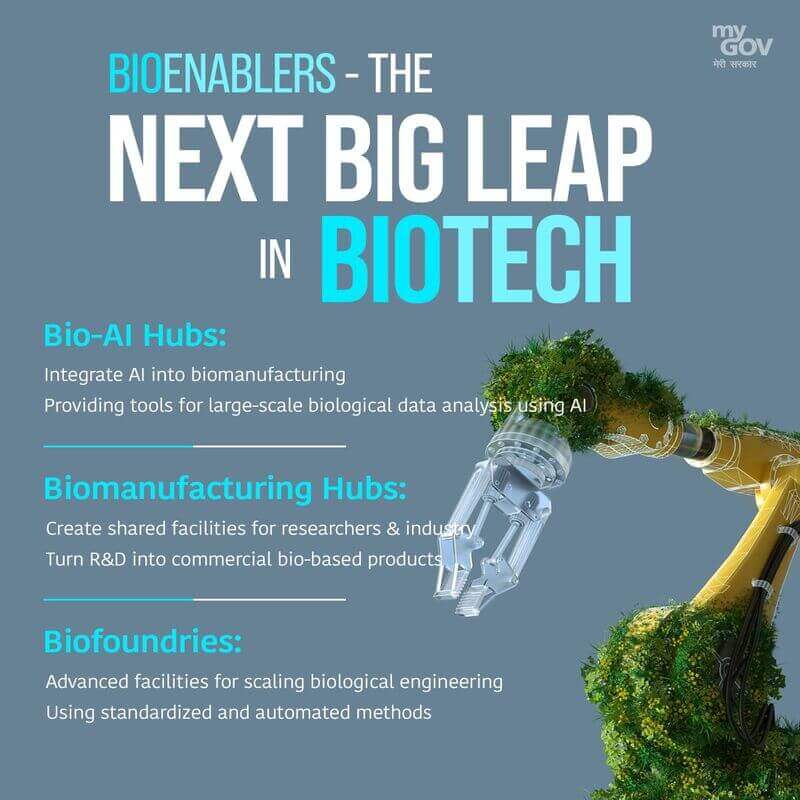
The BioE3 (Biotechnology for Economy, Environment, and Employment) Policy is an initiative by the Indian government aimed at leveraging biotechnology to foster economic growth, environmental sustainability, and job creation. This policy aligns with India’s broader sustainable development and technological advancement goals. Read here to learn more.
The Union Cabinet, chaired by the Prime Minister approved the proposal ‘BioE3 (Biotechnology for Economy, Environment and Employment) Policy for Fostering High Performance Biomanufacturing’ of the Department of Biotechnology.
The salient features of BioE3 policy include innovation-driven support to R&D and entrepreneurship across thematic sectors.
This will accelerate technology development and commercialization by establishing Biomanufacturing & Bio-AI hubs and Bio-foundry.
Along with prioritizing regenerative bioeconomy models of green growth, this policy will facilitate the expansion of India’s skilled workforce and provide a surge in job creation.
Biomanufacturing
Our present era is an opportune time to invest in the industrialization of biology to promote sustainable and circular practices to address some of the critical societal issues such as climate change mitigation, food security and human health.
Building a resilient biomanufacturing ecosystem in our nation is important to accelerate cutting-edge innovations for developing bio-based products.
High-performance biomanufacturing is the ability to produce products from medicine to materials, address farming and food challenges, and promote the manufacturing of bio-based products through the integration of advanced biotechnological processes.
To address the national priorities, the BioE3 Policy would broadly focus on the following strategic/thematic sectors: high-value bio-based chemicals, biopolymers & enzymes; smart proteins & functional foods; precision biotherapeutics; climate resilient agriculture; carbon capture & its utilization; marine and space research.
Key Objectives of BioE3 Policy

- Economic Growth:
- Innovation in Biotechnology: The policy promotes research and innovation in biotechnology to drive economic growth. It focuses on developing new products, technologies, and processes that can be commercialized to enhance India’s global competitiveness in biotechnology.
- Biotech Start-ups and Industry Support: Encourages the growth of biotech start-ups and provides support to existing biotech industries through financial incentives, infrastructure development, and ease of doing business initiatives.
- Environmental Sustainability:
- Green Biotechnology: Emphasizes the use of biotechnology in developing environmentally sustainable practices. This includes developing genetically modified crops that require fewer resources, bio-remediation technologies, and biofuels.
- Climate Change Mitigation: Supports the development of biotech solutions to combat climate change, such as carbon capture technologies and sustainable agricultural practices.
- Employment Generation:
- Skilled Workforce Development: Focuses on creating a skilled workforce for the biotechnology sector through educational programs, vocational training, and industry partnerships.
- Job Creation: Aims to create employment opportunities across the biotechnology value chain, from research and development to manufacturing and distribution.
Strategic Focus Areas
The BioE3 Policy primarily concentrate on the following strategic sectors: high-value bio-based chemicals, biopolymers & enzymes; smart proteins & functional foods; precision biotherapeutics; climate-resilient agriculture; carbon capture & its utilization; marine and space research.
- Agricultural Biotechnology: Development of biotech crops and technologies to increase farm productivity and resilience to climate change.
- Healthcare Biotechnology: Focus on developing affordable biotech healthcare solutions, including vaccines, diagnostics, and therapeutics, especially for diseases prevalent in India.
- Industrial Biotechnology: Promoting the use of biotechnology in industries for the production of biofuels, bioplastics, and other bio-based materials.
- Environmental Biotechnology: Encourages the development of biotechnological solutions for environmental conservation, including waste management, pollution control, and biodiversity conservation.
Implementation Strategy
- Public-Private Partnerships: The policy encourages collaborations between government institutions, private companies, and international organizations to drive innovation and commercialization in biotechnology.
- Regulatory Reforms: Streamlines the regulatory framework to facilitate faster approval and commercialization of biotech products while ensuring safety and ethical standards.
- Investment in Infrastructure: Focuses on developing world-class biotech infrastructure, including research parks, incubation centres, and testing facilities.
Implications of BioE3 Policy
The BioE3 Policy is expected to position India as a global leader in biotechnology, driving significant advancements in healthcare, agriculture, and environmental management.
- It also aims to generate substantial employment opportunities and contribute to the country’s economic growth, while addressing pressing environmental challenges.
- Overall, this Policy will further strengthen the Government’s initiatives such as ‘Net Zero’ carbon economy & ‘Lifestyle for Environment’ and will steer India on the path of accelerated ‘Green Growth’ by promoting a ‘Circular Bioeconomy’.
- The BioE3 Policy will foster and advance a future that is more sustainable, innovative, and responsive to global challenges and lays down the Bio-vision for Viksit Bharat.
What is bio-foundry?
A bio-foundry is a facility or platform designed to accelerate and streamline the engineering of biological systems for various applications.
It integrates automation, synthetic biology, and computational tools to enable the rapid design, construction, testing, and optimization of biological parts, cells, and organisms.
Key Features of a Bio-Foundry:
- Automation: Bio-foundries use robotics and automated systems to perform repetitive tasks such as DNA assembly, cell culture, and high-throughput screening. This reduces human error and speeds up the experimental process.
- Synthetic Biology: They focus on the design and construction of new biological parts, devices, and systems, as well as the re-design of existing, natural biological systems for useful purposes. This includes the creation of genetically modified organisms (GMOs) with desired traits.
- Computational Tools: Bio-foundries employ advanced computational models and algorithms to design experiments, predict outcomes, and analyze data. This enhances the efficiency and accuracy of biological engineering.
- High-Throughput Screening: The facility is capable of testing thousands of biological variants simultaneously, allowing researchers to quickly identify the most promising candidates for further development.
- Standardization: Bio-foundries work towards standardizing biological parts and protocols, which facilitates the reproducibility and scalability of biological engineering efforts.
Applications:
- Healthcare: Development of new vaccines, gene therapies, and diagnostic tools.
- Agriculture: Creation of genetically engineered crops with improved yields, pest resistance, or nutritional content.
- Environmental Science: Engineering microbes for bioremediation or the production of biofuels.
- Industrial Biotechnology: Manufacturing of enzymes, bio-based chemicals, and other high-value products.
Conclusion
The BioE3 Policy represents a holistic approach to integrating biotechnology into India’s economic and environmental strategy, with a strong emphasis on creating employment.
Through this policy, India seeks to harness the potential of biotechnology to address critical challenges and seize opportunities in the 21st century.
Read: Space Biotechnology: Advent of Second Space age
-Article by Swathi Satish






Leave a Reply